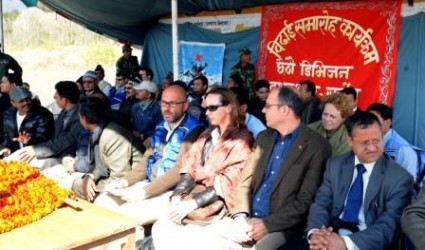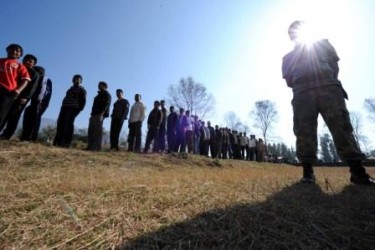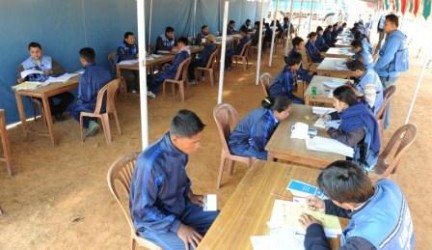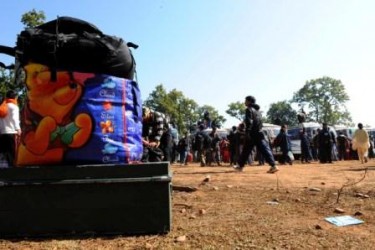
It’s been a while since I’ve blogged, but lots has been happening here in Nepal. If I’d written before Christmas, I think that my blog would have been pretty downbeat. Up until almost the very end of the year there was very little progress on the peace process and it was getting harder to be optimistic (as I generally like to be!) about the way things were going. Parliament was still being blocked, there were still strikes (bandhs) which meant total shut down throughout the Kathmandu Valley – no motorised vehicles of any kind, the drafting of the constitution was well behind schedule and it seemed that the key players didn’t really want to talk to each other.
With a new year, comes – potentially – a new beginning. Now I don’t want to sound naïve, but there has been positive progress in the last few weeks. To name just a few, just before Christmas the Maoist Party stopped blocking parliament, so for the first time in months Nepal has a fully functioning parliament. The long awaited High Level Political Mechanism – which is supposed to resolve the really knotty peace process issues such as the future of the 19,600 ex-Maoist fighters – has been formed with the participation of the three largest political parties, and they are talking (always a good thing!). And lastly – and I think potentially most heartening – the discharge of the so-called “disqualified” combatants from the camps has been completed peacefully.

There are about 4,000 “disqualified” – really a strange term to use – of which around 3,000 were under age when they joined the Maoist army (they were child soldiers during the war, even though many are now over 18), and about 1,000 were late recruits to the Maoist army (they joined after the fighting was officially over). I went to the far west of Nepal last week, to a place near Surkhet, to witness one of the discharge ceremonies. It was very interesting and really quite moving. Quite a few of the “disqualified” had already left the camps, but there were still over 600 in this camp alone who were to be discharged.
All the “disqualified” were registered with the UN monitors (see the photo) and given an identity card, which certifies them as an ex-combatant. The card also has a telephone number on it which these young people can call any time in the next year and get advice on what to do next. There are four “packages” available to them to help them reintegrate back into civilian life: vocational training; training as a health worker; setting up their own business or going back to school. The UK has helped fund these packages, which are offered by the UN and its partners on behalf of the government.

At the ceremony, there were some speeches (you can see me on the podium with the UN and Maoist commanders) by the Maoist Commandant of the camp, the Deputy Commander of the Maoist Army, and the Head of the UN in Nepal. They were then each given a tikka (red mark on their foreheads) and a garland of marigolds, and sent towards the buses which would take them to the nearest town from which they start their way home and to a new life.
I watched the faces of these young people. There is some anger amongst them that they fought for what they believed in and now they are being discharged and sent home and being told that they are “disqualified” – the term in Nepali is apparently even more negative, meaning almost “unfit”. Some of the young men had been drinking, causing a bit of trouble and breaking chairs to vent their frustration and anger the morning we arrived for the ceremony. The ceremony however passed peacefully and the looks on most of these young faces as they passed me to go to the bus was sad, lost, many tearful, some defiant, some clearly very apprehensive. Understandable when you consider that most of their adult lives had been fighting for or living in a camp under the control of the Maoist army. They probably had little idea what was waiting for them outside the camp. My heart really went out to them, especially the young girls, with young babies, of whom there were quite a few. Take a look at this excellent photo essay from UNICEF which brilliantly captures the process.

The discharge of the “disqualified” is now over. We can’t really say if it was successful or not yet, as that will depend on how these young people are welcomed back to their villages and hopefully reintegrated into civilian life. I really hope that they all manage to forge for themselves a more peaceful existence in a peaceful Nepal.
This is one important step forward, but a huge challenge awaits, which is to resolve the future of the remaining 19,600 ex-Maoist fighters still in the camps, and to help them move on to a new life...

8 comments
Comment by Oli Md. Abdullah Chowdhury posted on
It is a touching description as Sarah Sanyahumbi delineated the scene. I had the opportunity to meet Sarah for a brief period at BRAC Inn in Dhaka while she was acting chief of DFIDB Bangladesh; however I am really impressed with the description of child soldiers.
In South Asia, all children do not have equal chance. Particularly, children from underprivileged section face many challanges and war or war-like situation simply add to their miseries. Children do not want to get disqualified as it is portrayed in this writing.
Moreover, the taks of rehab is not easy at all. It has not been easy to reintegrate children coming in conflict with law in to the society as I have witnessed in Bangladesh. Therefore, reintegration into civilian life for those disqualified would be even more difficult.
However, providing adequate support is very vital. If they are not provided with sufficient guidance and advice; those ex-soldiers might get derailed from the track.
Comment by Pierre LeLoup posted on
South Asia or not, there's simply no country in the entire world where you can find the situation with children having equal chances. Unless you want a dictatorial fascist-like regime like in Cuba or in North Corea?
But even in those "exceptional" countries, the children of "revolutionary" upper class are obviously over privileged.
The whole question about equality, equity and subsequent politics represent therefore a political lie, mostly socialist or, which is rather recent, religious.
Comment by Mochi Sada posted on
Dear Sarah,
Thank you very much for heart touching elaboration of discharge process of so called disquilified ex-combatants. Once again I congratulate you for identifying important associative problem of Nepal. But I invite you once again to go deep in the ascriptive problem of Nepal.
You, the western establishment always see communism as a problem in Nepal. But think where is communism in Nepal, and which are communist parties in Nepal. Do not see on the tags. Actually, communism never existed in Nepalese society or in the mindset of average Nepali as Dr. Chaitanya Mishra difines in his many articles. Fundamental characters of Nepalese society remained as the most feudalistic or capitalist. And even today, Nepalese communist leaders are more capitalist than the other so called democratic parties.
You can ask what is the ascriptive problem of Nepal. And my only single word answer is 'Bahunbad'. Not only me, from Dor Bahadur Bista to Dr. Harka Gurung, all of the famous social engineers have identified Bahunbad as the source of all kinds of injustice (political, social, economic and civic) in Nepal. If Bahunbad is eliminated, comminism in Nepal will be over in Nepal. So, it is communist parties which want continuation of Bahunism in Nepal so that their political farming will be continually beneficial. And secondly you donors, which want politically exploite Nepal more and more using the corrupted Bahunbadi regime.
Think upon your role and liability towards the released ex-combatants. You donors can pour billion pound for engaging Bahuns and elites in your so called development projects. Did you give sufficient money for the settlement of these youths? They got substantive money of NRs.26,000 (£215). Rest of the thing they got is 'oral assurance'. How can you people claim that you are contributing to restore peace? I am just seeing you are fuelling more conflict and insurgency in Nepal.
Hope, DFID will not be among others and will try to do things differently.
Comment by nishchal n. pandey posted on
excellent article, lots of positivism in an atmosphere of broad day light killings taking place in Janakpur yesterday and then again in Kathmandu. Wonder if the wider SSR debate has got also to do with the deteriorating security situation in the valley. During the people's war, the villages and districts were targetted but now it has become the capital city that is seeing all this criminality. Keep it up Sarah!
Comment by Nishchal N. Pandey posted on
I hadn't finished yet. The future as shared by you is difficult for these ex-combatants because its not so easy to get visas to go abroad for work in the Gulf or in Malaysia. Its difficult to get job in Nepal. They will have to remain in Maoist command structure otherwise join some other armed group(s). What other option is left with them given the fact that they are non-skilled, forgotten to till the fields and are not absorbed in the security sector because of their under-age?
DFID and especially you are doing great job, wish you would be more interactive and bring in more 'experts' from the Nepali society, try to reach out to all sections of the Nepali polity which is very very diverse. Thank you again for posting this very well written article.
Comment by Ananta Gautam posted on
Dear Sarah,
i suppose what u have written is based on your duty. But to the dismay of Nepali people, our politicians have been failing to forge consensus in minor issues. so i think until our political situation will not come in to a conclusive stand, efforts of the international organisations like yours would be in vain.
i am a citizen of nepal and we have almost lost all our hopes about our politicians.
May be now its time to do something from our side.
Any way, thank you verymuch for your time to think about our country.
Ananta Gautam
a Nepali citizen in real anxiety.
Comment by Youb Raj Basnet posted on
Dear Sarah,
Very glad to read your concluding part and I believe that UK will continue investing tangible resources to overcome from such problems in the world. Interested to know your view on latest developments in Nepal.
Youb
Comment by surbir kunwar posted on
nice job ,keep it up.